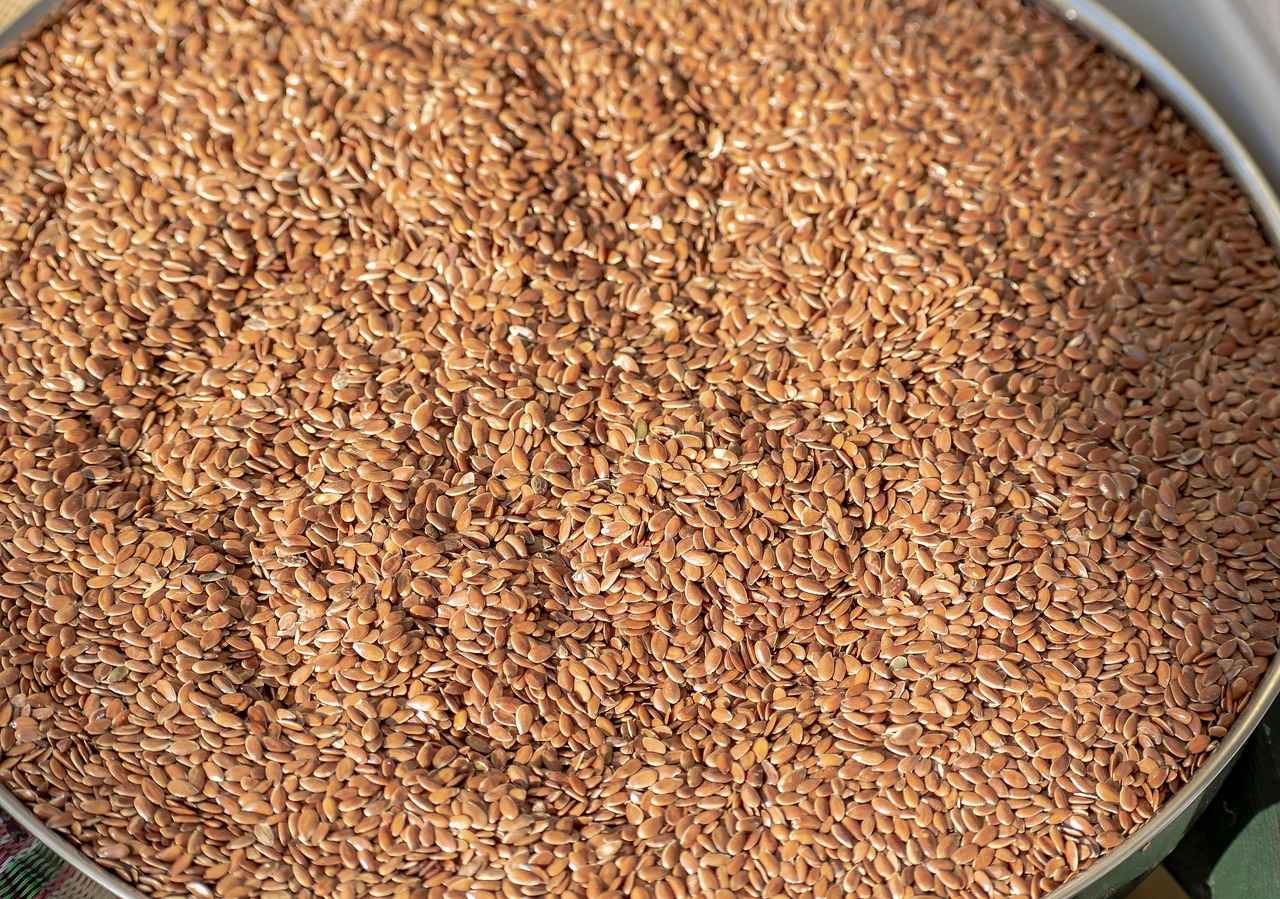This article explores the nutritional benefits, uses, and health impacts of flax seeds and chia seeds, helping you determine which superfood is best for your diet.
Flax seeds are small brown or golden seeds packed with nutrients. They are particularly known for their high omega-3 fatty acid content, which is essential for heart health. These seeds also contain fiber, protein, and various vitamins, making them a popular addition to many diets.
Chia seeds, tiny black or white seeds, are rich in fiber, protein, and omega-3 fatty acids. Their versatility in recipes and numerous health benefits have made them a staple in health-conscious diets. Chia seeds can absorb water and expand, making them excellent for hydration and satiety.
Understanding the nutritional differences between flax seeds and chia seeds is crucial. Below is a table comparing their key nutritional components:
| Nutrient | Flax Seeds (per 1 oz) | Chia Seeds (per 1 oz) |
|---|---|---|
| Calories | 150 | 138 |
| Protein | 5.2g | 4.7g |
| Fiber | 7.8g | 10.6g |
| Omega-3 Fatty Acids | 6.3g | 5g |
Flax seeds offer a range of health benefits, including improved heart health and reduced inflammation. Research indicates that flax seeds can lower cholesterol levels and improve cardiovascular function.
Flax seeds contain lignans, which may help balance hormones. This is particularly beneficial for women, as lignans can influence estrogen levels and support menstrual health.
Chia seeds are celebrated for their numerous health benefits, including weight management and improved digestion. Their high fiber content aids in feeling full, which can assist with weight loss.
The fiber in chia seeds promotes a healthy gut. This helps prevent constipation and encourages regular bowel movements, contributing to overall digestive health.
Incorporating flax and chia seeds into your meals can enhance their nutritional value. Here are some practical tips:
- Add flax seeds to smoothies or oatmeal for a nutrient boost.
- Use chia seeds to make puddings or as a thickening agent in recipes.
- Sprinkle both seeds on salads or yogurt for added crunch and nutrition.
While both seeds are nutritious, they may have side effects or interactions. Some individuals may experience allergies to flax or chia seeds, leading to symptoms such as digestive discomfort or skin reactions.
Flax and chia seeds can interact with certain medications, particularly blood thinners. It is essential to consult with a healthcare provider before adding these seeds to your diet, especially if you are on medication.

What Are Flax Seeds?
Flax seeds, derived from the flax plant, are small, flat seeds that come in a variety of colors, primarily brown and golden. These seeds have gained significant attention in the health and wellness community due to their impressive nutritional profile. They are particularly renowned for their high content of omega-3 fatty acids, specifically alpha-linolenic acid (ALA), which is essential for heart health and overall wellness.
In addition to omega-3s, flax seeds are a rich source of dietary fiber, providing both soluble and insoluble fibers that promote digestive health. They also contain a unique class of phytoestrogens known as lignans, which may contribute to hormonal balance and offer antioxidant properties. This combination of nutrients makes flax seeds a versatile addition to various diets, whether for weight management, heart health, or simply enhancing overall nutrition.
Flax seeds are often labeled as a superfood due to their numerous health benefits. Research suggests that regular consumption of flax seeds can lead to a variety of positive health outcomes. For instance, they may help in lowering cholesterol levels, thereby reducing the risk of heart disease. The high fiber content also aids in regulating blood sugar levels, making them a beneficial food for individuals with diabetes.
- Heart Health: Flax seeds have been shown to improve cardiovascular health by reducing blood pressure and cholesterol.
- Digestive Health: The fiber in flax seeds promotes regular bowel movements and can prevent constipation.
- Hormonal Balance: Lignans in flax seeds may help balance hormones, particularly in women, potentially alleviating symptoms of menopause.
- Anti-inflammatory Properties: Omega-3 fatty acids in flax seeds can help reduce inflammation in the body.
Adding flax seeds to your diet can be simple and delicious. Here are some practical ways to include them:
- Smoothies: Blend a tablespoon of ground flax seeds into your morning smoothie for an extra nutrient boost.
- Baking: Substitute some flour in your baking recipes with ground flax seeds to enhance the nutritional value of muffins, pancakes, and bread.
- Salads: Sprinkle whole or ground flax seeds over salads for added crunch and nutrition.
- Oatmeal: Stir in flax seeds into your oatmeal or yogurt for a hearty breakfast.
It is essential to note that flax seeds should be consumed ground rather than whole, as this improves nutrient absorption. Whole flax seeds may pass through the digestive system undigested, limiting their health benefits.
While flax seeds are generally safe for most people, some may experience mild side effects, such as digestive discomfort if consumed in large quantities. It is advisable to start with small amounts and gradually increase intake. Additionally, individuals taking certain medications should consult with a healthcare provider, as flax seeds can interact with blood thinners and other medications.
In conclusion, flax seeds are a powerhouse of nutrition, offering a multitude of health benefits. Their versatility in recipes makes them an easy addition to any diet. By understanding their properties and how to use them effectively, you can harness the full potential of these tiny seeds for better health.

What Are Chia Seeds?
Chia seeds, derived from the Salvia hispanica plant, are tiny black or white seeds that have gained significant attention in the health and wellness community. These seeds are not just a trendy addition to smoothies; they are packed with essential nutrients that contribute to overall health. Their nutritional profile is impressive, making them a popular choice for those looking to enhance their diets.
One of the most notable features of chia seeds is their high content of fiber. In fact, just one ounce (about 28 grams) of chia seeds contains approximately 11 grams of fiber, which is more than a third of the recommended daily intake. This fiber content is crucial for maintaining digestive health, as it aids in regular bowel movements and helps prevent constipation. Additionally, the soluble fiber found in chia seeds can absorb water, forming a gel-like substance that promotes a feeling of fullness, making them an excellent choice for those managing their weight.
Chia seeds are also an excellent source of plant-based protein. With about 4 grams of protein per ounce, they can be a valuable addition to vegetarian and vegan diets. Protein is essential for muscle repair and growth, and it plays a vital role in various bodily functions. Moreover, chia seeds contain all nine essential amino acids, making them a complete protein source.
Another remarkable aspect of chia seeds is their high concentration of omega-3 fatty acids, particularly alpha-linolenic acid (ALA). These healthy fats are known for their anti-inflammatory properties and their ability to support heart health. Incorporating chia seeds into your diet can help improve cholesterol levels and reduce the risk of heart disease.
Beyond their nutritional benefits, chia seeds are incredibly versatile in culinary applications. They can be easily added to a variety of dishes, including:
- Smoothies: Blend them into your favorite smoothie for added nutrition.
- Oatmeal: Stir them into oatmeal or yogurt for extra texture and health benefits.
- Baked Goods: Incorporate chia seeds into muffins, bread, or pancakes for a nutritious boost.
- Puddings: Mix chia seeds with milk or a milk alternative to create a delicious chia pudding.
Chia seeds are also known for their ability to absorb liquid, expanding up to 10-12 times their original size. This property not only enhances their use in recipes but also contributes to their health benefits by promoting hydration and satiety.
In summary, chia seeds are a nutrient-dense superfood that can be easily integrated into various meals. Their high fiber, protein, and omega-3 fatty acid content make them a valuable addition to any diet. Whether you are looking to improve your digestive health, increase your protein intake, or simply add a nutritious element to your meals, chia seeds are an excellent choice.

Comparative Nutritional Profiles
Understanding the nutritional differences between flax seeds and chia seeds is crucial for making informed dietary choices. Both seeds are heralded as superfoods, but their unique nutrient profiles can significantly impact your health. This section breaks down their macro and micronutrient content, allowing you to see how each seed can fit into your diet.
| Nutrient | Flax Seeds (per 100g) | Chia Seeds (per 100g) |
|---|---|---|
| Calories | 534 | 486 |
| Protein | 18g | 17g |
| Fat | 42g | 31g |
| Omega-3 Fatty Acids | 22g | 17g |
| Fiber | 27g | 34g |
| Calcium | 255mg | 631mg |
| Iron | 5mg | 7.7mg |
As observed in the table, both seeds provide a substantial amount of protein and healthy fats, particularly omega-3 fatty acids, which are essential for heart health. However, flax seeds are notably higher in fat content, making them a rich source of energy. On the other hand, chia seeds excel in fiber and mineral content, particularly calcium and iron, which are vital for bone health and oxygen transport in the body.
When it comes to fiber content, chia seeds take the lead. They contain approximately 34g of fiber per 100g, compared to flax seeds’ 27g. This high fiber content can promote digestive health and enhance feelings of fullness, making chia seeds an excellent option for those looking to manage their weight. Additionally, the soluble fiber in chia seeds can help regulate blood sugar levels, which is beneficial for individuals with diabetes.
Micronutrient Benefits
Flax seeds are particularly rich in lignans, a type of phytoestrogen that may contribute to hormonal balance and have antioxidant properties. This makes them a great choice for women, especially during menopause. In contrast, chia seeds are packed with antioxidants, which can help combat oxidative stress and inflammation in the body.
In terms of culinary uses, both seeds are versatile. Flax seeds can be ground into a meal and added to smoothies, baked goods, or sprinkled on cereals. Chia seeds can absorb liquid and form a gel-like consistency, making them ideal for puddings, smoothies, or as a thickening agent in recipes.
Ultimately, the choice between flax seeds and chia seeds may come down to personal dietary needs and preferences. Incorporating both into your diet can provide a diverse range of nutrients and health benefits.
Omega-3 Fatty Acids: A Key Nutrient
When it comes to omega-3 fatty acids, both flax seeds and chia seeds stand out as exceptional sources. However, they present different forms of omega-3s, which can affect how your body absorbs and utilizes these essential fats. This section delves into the nuances of omega-3 fatty acids from both seeds and their implications for your health.
Omega-3 fatty acids are crucial for maintaining various bodily functions. They play a significant role in heart health, brain function, and reducing inflammation. The primary types of omega-3s include:
- Ala (Alpha-linolenic acid): Found in plant sources like flax and chia seeds.
- Epa (Eicosapentaenoic acid): Primarily found in fish and algae.
- Dha (Docosahexaenoic acid): Also mainly sourced from fish and algae.
Flax seeds are particularly rich in alpha-linolenic acid (ALA), a type of omega-3 fatty acid. Studies suggest that ALA can contribute to heart health by:
- Lowering blood pressure
- Reducing cholesterol levels
- Decreasing inflammation throughout the body
However, the conversion rate of ALA to EPA and DHA in the body is relatively low, which means that while flax seeds are beneficial, they may not provide sufficient levels of these other omega-3s.
Chia seeds also contain a high amount of ALA, making them an excellent option for those seeking plant-based omega-3s. In addition to their omega-3 content, chia seeds are packed with fiber and protein, which can enhance their health benefits. The combination of these nutrients helps to:
- Regulate blood sugar levels
- Promote satiety, aiding in weight management
- Support digestive health
While both seeds are rich in ALA, the body’s ability to absorb and convert these omega-3s can vary. The bioavailability of omega-3s from chia seeds may be higher due to their unique gel-forming properties when soaked in liquid. This gel can enhance nutrient absorption in the digestive tract. In contrast, flax seeds require grinding to maximize nutrient release, making preparation slightly more complex.
The health benefits of omega-3 fatty acids are well-documented. Regular consumption of these essential fats can lead to:
- Improved cardiovascular health
- Enhanced cognitive function
- Reduction in symptoms of depression and anxiety
Incorporating either flax or chia seeds into your diet can contribute to your daily omega-3 intake, but understanding their differences can help you choose the right one for your needs.
To make the most of the omega-3s in flax and chia seeds, consider the following tips:
- For Flax Seeds: Always grind them before consumption to enhance absorption.
- For Chia Seeds: Soak them in water or milk to create a gel-like consistency, which can be added to smoothies or puddings.
Both seeds can be easily incorporated into a variety of dishes, ensuring you reap the health benefits of omega-3 fatty acids.
Fiber Content: Which Seed Wins?
Fiber is a crucial component of a healthy diet, playing an essential role in promoting digestive health, enhancing satiety, and preventing various gastrointestinal issues. In the quest for superfoods, flax seeds and chia seeds have emerged as popular contenders, both boasting impressive fiber content. But which of these tiny seeds reigns supreme when it comes to fiber? Let’s dive deeper into their fiber profiles and understand how they can impact your gut health.
Fiber is a type of carbohydrate that the body cannot digest. It passes through the digestive system, helping to regulate bowel movements and maintain gut health. A diet rich in fiber can aid in weight management, lower cholesterol levels, and reduce the risk of chronic diseases such as diabetes and heart disease. The recommended daily intake of fiber is about 25 grams for women and 38 grams for men, but most people fall short of these guidelines.
Flax seeds are often praised for their high content of soluble and insoluble fiber. One ounce (about 28 grams) of flax seeds contains approximately 8 grams of fiber, making them an excellent choice for boosting your fiber intake. The soluble fiber in flax seeds forms a gel-like substance in the gut, which can help slow digestion and promote a feeling of fullness. This can be particularly beneficial for those looking to manage their weight or reduce cravings.
Chia seeds, on the other hand, are known for their remarkable ability to absorb liquid, expanding up to 12 times their original size when soaked. An ounce of chia seeds also contains about 11 grams of fiber, which is higher than flax seeds. The majority of the fiber in chia seeds is soluble, which aids in digestion and helps regulate blood sugar levels. This characteristic makes chia seeds particularly effective in promoting satiety, as their gel-like consistency can keep you feeling full for longer periods.
Both flax and chia seeds contribute positively to gut health, but they do so in slightly different ways. The soluble fiber in both seeds can help to regulate bowel movements and prevent constipation. However, the high soluble fiber content in chia seeds may offer an extra edge in promoting digestive health due to their unique ability to form a gel-like substance that can assist in moving food through the digestive tract.
When it comes to weight management, both seeds can be beneficial, but chia seeds might have a slight advantage due to their higher fiber content. The increased fiber intake from chia seeds can lead to greater feelings of fullness, potentially reducing overall calorie intake. This can be particularly advantageous for those looking to lose or maintain weight. However, flax seeds are also effective in promoting satiety and can be a valuable addition to any diet.
In summary, both flax seeds and chia seeds offer significant fiber benefits, contributing to digestive health and satiety. While flax seeds provide a robust amount of fiber and are rich in omega-3 fatty acids, chia seeds take the lead with a higher fiber content and unique gel-forming properties. Incorporating both seeds into your diet can provide a well-rounded approach to enhancing your fiber intake and supporting overall health.

Health Benefits of Flax Seeds
Flax seeds, derived from the flax plant, are not just a trendy health food but a powerhouse of nutrition. They have been consumed for thousands of years and are recognized for their numerous health benefits. This section explores the significant health advantages of incorporating flax seeds into your diet, supported by scientific research.
Flax seeds offer a multitude of health benefits, ranging from improved heart health to reduced inflammation. Below, we delve into the specific ways flax seeds can enhance your well-being.
One of the most compelling benefits of flax seeds is their positive impact on heart health. Studies have shown that flax seeds can help lower cholesterol levels and reduce the risk of heart disease. The high content of omega-3 fatty acids in flax seeds contributes significantly to these benefits. Omega-3s are known to reduce inflammation and improve arterial function, which are crucial for maintaining a healthy heart.
Chronic inflammation is linked to various diseases, including heart disease and cancer. Flax seeds contain lignans and alpha-linolenic acid (ALA), both of which have anti-inflammatory properties. Research has indicated that regular consumption of flax seeds can lead to a decrease in inflammatory markers in the body, promoting overall health and wellness.
Flax seeds are rich in lignans, a type of phytoestrogen that may help balance hormones, especially in women. Some studies suggest that these compounds can alleviate symptoms associated with menopause and support menstrual health. By modulating estrogen levels, flax seeds may provide relief from hormonal imbalances.
The high fiber content of flax seeds plays a vital role in promoting digestive health. They are an excellent source of both soluble and insoluble fiber, which aids in regular bowel movements and prevents constipation. Additionally, fiber helps maintain a healthy gut microbiome, further enhancing digestive function.
Emerging research suggests that flax seeds may have protective effects against certain types of cancer, particularly breast and prostate cancer. The lignans found in flax seeds have been studied for their potential to inhibit cancer cell growth and promote apoptosis (programmed cell death) in malignant cells. Although more research is needed, these findings are promising for those looking to incorporate cancer-fighting foods into their diets.
Adding flax seeds to your diet is easy and versatile. They can be sprinkled on salads, blended into smoothies, or incorporated into baked goods. Ground flax seeds are particularly beneficial as they enhance nutrient absorption. Aim for a daily intake of 1-2 tablespoons to reap the maximum health benefits.
While flax seeds are generally safe for most individuals, some may experience digestive discomfort if consumed in large quantities. It’s essential to gradually introduce flax seeds into your diet and ensure adequate hydration to avoid any gastrointestinal issues. Additionally, individuals on certain medications should consult their healthcare provider, as flax seeds may interact with blood thinners and hormone therapies.
In summary, flax seeds are a nutrient-dense superfood that can significantly enhance your health. With benefits ranging from improved heart health to hormonal balance, they are a valuable addition to any diet.
Flax Seeds and Heart Health
Flax seeds have garnered significant attention in recent years for their potential health benefits, particularly regarding heart health. Research indicates that these tiny seeds can effectively lower cholesterol levels and support cardiovascular function. In this section, we will explore the mechanisms behind these benefits, providing a comprehensive understanding of how flax seeds contribute to heart health.
- Rich Source of Omega-3 Fatty Acids: Flax seeds are one of the best plant-based sources of alpha-linolenic acid (ALA), a type of omega-3 fatty acid. Omega-3s are known for their anti-inflammatory properties, which can help reduce the risk of heart disease.
- Cholesterol Reduction: Studies have shown that incorporating flax seeds into the diet can lead to a significant reduction in LDL cholesterol, often referred to as “bad” cholesterol. This is crucial because high levels of LDL cholesterol are associated with an increased risk of heart disease.
- Improved Blood Vessel Function: Flax seeds may enhance endothelial function, which is vital for maintaining healthy blood vessels. Improved endothelial function can lead to better blood flow and lower blood pressure, both of which are essential for heart health.
- Antioxidant Properties: Flax seeds contain lignans, which possess antioxidant properties. Antioxidants help combat oxidative stress, a condition that can lead to inflammation and damage to blood vessels, further contributing to heart disease.
Several studies support these claims. For instance, a systematic review published in the American Journal of Clinical Nutrition found that flax seed supplementation significantly reduced total cholesterol and triglyceride levels in participants. Additionally, another study highlighted that regular consumption of flax seeds was linked to a lower incidence of heart disease among women.
To maximize the heart health benefits of flax seeds, it is essential to incorporate them into your diet properly. Ground flax seeds are more easily absorbed by the body compared to whole seeds, making them a better option for those looking to enhance their nutritional intake. You can add ground flax seeds to smoothies, yogurt, or even baked goods for a nutritious boost.
In summary, the heart health benefits of flax seeds are backed by research and can be attributed to their rich content of omega-3 fatty acids, cholesterol-lowering properties, and antioxidant effects. By including flax seeds in your diet, you can take a proactive step towards improving your cardiovascular health.
Flax Seeds for Hormonal Balance
Flax seeds have garnered attention in recent years for their potential health benefits, particularly regarding hormonal balance. These tiny seeds are rich in lignans, a type of phytoestrogen that can mimic estrogen in the body. This section explores how flax seeds may influence hormonal health, especially in women.
Lignans are compounds found in flax seeds that have antioxidant properties. They can bind to estrogen receptors in the body, potentially helping to balance hormone levels. This is particularly beneficial for women experiencing hormonal fluctuations due to factors such as menstruation, pregnancy, or menopause. Studies suggest that lignans may help alleviate symptoms associated with these changes.
During menopause, women often experience a decrease in estrogen levels, leading to various symptoms such as hot flashes, mood swings, and weight gain. Incorporating flax seeds into the diet may provide relief from these symptoms. Research indicates that lignans can help stabilize hormonal fluctuations, thereby reducing the severity of menopausal symptoms.
- Regulating Menstrual Cycles: For women with irregular menstrual cycles, flax seeds may help promote regularity by influencing estrogen levels.
- Reducing PMS Symptoms: The anti-inflammatory properties of flax seeds can help alleviate symptoms of premenstrual syndrome (PMS), such as cramps and mood swings.
- Supporting Fertility: Some studies suggest that flax seeds can improve fertility by balancing hormones and promoting ovulation.
To reap the hormonal benefits of flax seeds, consider the following practical tips:
- Add to Smoothies: Blend flax seeds into your morning smoothie for an easy nutritional boost.
- Sprinkle on Salads: Add ground flax seeds to salads for extra crunch and health benefits.
- Baking: Substitute flaxseed meal for part of the flour in baked goods for added nutrients.
While flax seeds are generally safe for most people, it’s essential to consume them in moderation. Overconsumption can lead to digestive issues such as bloating or gas. Additionally, individuals on hormone-related medications should consult a healthcare provider before adding flax seeds to their diet, as they may interact with certain medications.
In conclusion, flax seeds present a promising option for women seeking to maintain hormonal balance. With their rich content of lignans and other beneficial nutrients, these seeds can be a valuable addition to a balanced diet. By incorporating flax seeds into daily meals, women may experience improved hormonal health and a greater sense of well-being.

Health Benefits of Chia Seeds
Chia seeds, derived from the Salvia hispanica plant, have gained immense popularity as a superfood due to their rich nutritional profile and numerous health benefits. These tiny seeds are packed with essential nutrients that can contribute to overall wellness. In this section, we will delve into the specific health benefits of chia seeds, focusing on their role in weight management and digestive health, supported by scientific evidence.
Chia seeds are an excellent source of fiber, protein, and omega-3 fatty acids. Just two tablespoons of chia seeds contain approximately 11 grams of fiber, which is crucial for maintaining digestive health. Additionally, they are rich in antioxidants, vitamins, and minerals, making them a valuable addition to any diet.
One of the most significant benefits of chia seeds is their potential to aid in weight management. The high fiber content in chia seeds helps promote a feeling of fullness, which can lead to reduced calorie intake. When chia seeds are mixed with liquid, they absorb up to 12 times their weight, forming a gel-like substance that expands in the stomach. This expansion can help curb hunger and prevent overeating.
- Studies show that incorporating chia seeds into meals can lead to a decrease in overall calorie consumption.
- They can be easily added to smoothies, yogurt, or salads, enhancing the nutritional value of meals.
- Chia seeds also provide a slow release of energy, which can help maintain stable blood sugar levels, reducing cravings.
The fiber in chia seeds plays a vital role in promoting digestive health. A diet rich in fiber is essential for regular bowel movements and preventing constipation. Chia seeds are a soluble fiber, which means they can help absorb water and form a gel-like substance in the digestive tract. This gel can aid in the smooth passage of food through the intestines.
- Regular consumption of chia seeds may help improve gut health by supporting the growth of beneficial gut bacteria.
- They also help in maintaining a healthy pH level in the stomach, which is crucial for digestion.
- Incorporating chia seeds into your diet can lead to improved bowel regularity and overall digestive comfort.
Beyond weight management and digestive health, chia seeds offer several other health benefits:
- Heart Health: The omega-3 fatty acids found in chia seeds can help reduce inflammation and lower cholesterol levels, contributing to better heart health.
- Bone Health: Chia seeds are rich in calcium, phosphorus, and magnesium, which are essential for maintaining strong bones.
- Blood Sugar Control: Their high fiber content can assist in regulating blood sugar levels, making them a great option for individuals with diabetes.
In summary, chia seeds are a versatile and nutrient-dense food that can significantly contribute to a healthy diet. Their benefits for weight management and digestive health, along with their additional advantages, make them a worthwhile addition to your meals. By incorporating chia seeds into your daily routine, you can harness their power to improve your overall health and well-being.
Chia Seeds and Weight Management
Chia seeds have become increasingly popular in the health and wellness community, particularly for their potential role in weight management. But what makes these tiny seeds so effective for those looking to shed pounds? This section delves into the mechanisms through which chia seeds facilitate weight loss, emphasizing their high fiber content and unique properties.
One of the primary reasons chia seeds are beneficial for weight management is their remarkable fiber content. Just two tablespoons of chia seeds contain about 11 grams of fiber, which is a significant portion of the daily recommended intake. Fiber is crucial for promoting feelings of fullness, which can help individuals reduce overall calorie intake. When consumed, chia seeds absorb liquid and expand in the stomach, creating a gel-like substance that takes up space and slows digestion. This process can lead to prolonged satiety, making it easier to resist unhealthy snacks or large meals.
Moreover, the soluble fiber found in chia seeds plays a vital role in regulating blood sugar levels. By slowing the absorption of sugar into the bloodstream, chia seeds can help prevent spikes and crashes in energy, which often lead to cravings for sugary foods. This stabilization of blood sugar levels can be particularly beneficial for those trying to manage their weight, as it reduces the likelihood of overeating.
In addition to fiber, chia seeds are also a source of protein. Protein is another essential nutrient that contributes to feelings of fullness. Including protein in meals can enhance satiety, making it easier to maintain a healthy diet. Chia seeds contain approximately 4 grams of protein per two tablespoons, adding to their weight management benefits.
Another interesting aspect of chia seeds is their low calorie density. Despite being nutrient-dense, they are relatively low in calories, allowing individuals to consume a satisfying volume of food without exceeding their caloric goals. This makes chia seeds an excellent addition to meals and snacks, as they can enhance the nutritional profile without adding excessive calories.
Incorporating chia seeds into your diet is simple and versatile. They can be added to smoothies, sprinkled on salads, or mixed into yogurt and oatmeal. Additionally, chia seeds can be used as a thickening agent in recipes like puddings or soups, further increasing the volume of food consumed without significantly increasing calories.
To maximize the benefits of chia seeds for weight management, it is essential to consume them as part of a balanced diet that includes a variety of nutrients. Pairing chia seeds with healthy fats, such as avocados or nuts, can further enhance their satiating properties, making meals more satisfying and nutritious.
In summary, chia seeds can be a valuable tool for those looking to manage their weight effectively. By incorporating these seeds into your diet, you can take advantage of their high fiber and protein content, low calorie density, and ability to promote feelings of fullness. As you explore ways to include chia seeds in your meals, remember that consistency is key to achieving your weight management goals.
Chia Seeds for Digestive Health
Chia seeds have become a staple in health-conscious diets, and for good reason. These tiny seeds are not just a trendy superfood; they are packed with nutritional benefits that can significantly enhance your overall health. One of the most notable advantages of chia seeds is their ability to promote digestive health. In this section, we will explore how chia seeds can benefit your gut and help prevent constipation.
Chia seeds are incredibly rich in dietary fiber, containing about 10 grams of fiber per ounce. This high fiber content plays a crucial role in maintaining a healthy digestive system. Fiber is essential for proper bowel function, as it adds bulk to the stool, making it easier to pass through the intestines. This can help prevent issues such as constipation and promote regularity.
The fiber in chia seeds is primarily soluble fiber, which absorbs water and forms a gel-like substance in the digestive tract. This gel not only helps to slow down digestion, allowing for better nutrient absorption, but it also helps to keep you feeling full for longer periods. This can be particularly beneficial for those looking to manage their weight while also improving their gut health.
Another significant benefit of chia seeds is their positive impact on the gut microbiome. The fiber in chia seeds acts as a prebiotic, feeding the beneficial bacteria in your gut. A healthy gut microbiome is essential for optimal digestion, immune function, and overall health. By incorporating chia seeds into your diet, you can help support the growth of these good bacteria, contributing to a balanced gut environment.
- Chia Pudding: Soak chia seeds in almond milk or yogurt overnight to create a nutritious pudding.
- Smoothies: Add a tablespoon of chia seeds to your favorite smoothie for an extra fiber boost.
- Baking: Incorporate chia seeds into baked goods like muffins or bread for added texture and health benefits.
- Salads: Sprinkle chia seeds on salads for a crunchy texture and nutritional enhancement.
While chia seeds are generally safe for most people, it’s essential to consume them in moderation. Due to their high fiber content, excessive intake can lead to digestive discomfort, such as bloating or gas. It’s advisable to gradually increase your chia seed consumption and drink plenty of water to help mitigate these effects.
Incorporating chia seeds into your diet can be a simple yet effective way to enhance your digestive health. Their high fiber content, prebiotic properties, and versatility in various dishes make them an excellent choice for anyone looking to support gut health and prevent constipation. As with any dietary change, it’s always best to consult with a healthcare professional, especially if you have existing health conditions or concerns.

How to Incorporate Flax and Chia Seeds into Your Diet?
Incorporating flax and chia seeds into your meals can significantly enhance their nutritional value. These tiny powerhouses are packed with essential nutrients, making them a fantastic addition to a well-balanced diet. In this section, we will explore practical tips and innovative ideas for seamlessly integrating these seeds into your daily meals.
Flax and chia seeds are not only rich in omega-3 fatty acids but also provide a good source of fiber, protein, and various vitamins and minerals. Adding these seeds to your meals can boost your overall health, support digestion, and even aid in weight management.
- Smoothies: Add a tablespoon of ground flax seeds to your morning smoothie for an extra nutritional punch.
- Baking: Substitute a portion of flour with ground flax seeds in recipes for muffins, pancakes, or bread.
- Salads: Sprinkle whole or ground flax seeds on salads for added crunch and nutrition.
- Oatmeal: Mix flax seeds into your oatmeal or yogurt for a nutritious breakfast.
- Puddings: Combine chia seeds with almond milk and let them sit overnight to create a delicious and healthy pudding.
- Egg Substitute: Mix 1 tablespoon of chia seeds with 2.5 tablespoons of water to replace one egg in baking.
- Soups and Sauces: Stir chia seeds into soups or sauces to thicken them naturally.
- Energy Bars: Incorporate chia seeds into homemade energy bars for a nutritious snack.
For those looking to maximize the health benefits, consider combining both flax and chia seeds in your meals. A blend of these seeds can provide a wider range of nutrients and enhance the overall flavor of your dishes.
To maintain freshness and potency, it’s essential to store flax and chia seeds properly. Keep them in an airtight container in a cool, dark place, preferably in the refrigerator. This will help preserve their healthy oils and prevent them from going rancid.
Incorporating flax and chia seeds into your diet is an easy and effective way to enhance your meals’ nutritional profile. By using these practical tips and creative ideas, you can enjoy the numerous health benefits these superfoods offer while adding variety to your diet.
Easy Recipes with Flax Seeds
Flax seeds are a nutritional powerhouse that can easily be incorporated into a variety of dishes. Their mild, nutty flavor makes them a versatile ingredient, perfect for enhancing both sweet and savory recipes. Below, we explore some simple and delicious ways to enjoy flax seeds in your daily meals.
- Flax Seed Smoothie: Start your day with a refreshing smoothie by blending together a banana, a cup of spinach, a tablespoon of flax seeds, and your choice of milk or yogurt. This nutritious drink is rich in omega-3 fatty acids and will keep you energized.
- Flax Seed Oatmeal: Stir a tablespoon of ground flax seeds into your morning oatmeal for an extra boost of fiber. Top with fresh fruits, nuts, and a drizzle of honey for a satisfying breakfast.
- Baked Goods: Flax seeds can be added to muffins, pancakes, and breads. Replace one egg with a mixture of one tablespoon of ground flax seeds and three tablespoons of water for a vegan option that adds moisture and nutrition.
- Flax Seed Salad Dressing: Create a healthy salad dressing by whisking together olive oil, vinegar, a tablespoon of ground flax seeds, and your favorite herbs. This dressing not only enhances flavor but also adds a nutritional punch.
- Flax Seed Energy Balls: Combine oats, nut butter, honey, and flax seeds to form energy balls. Roll them into bite-sized pieces for a quick snack that’s perfect for on-the-go.
- Flax Seed Crackers: Mix ground flax seeds with water, seasonings, and your choice of seeds or nuts. Spread the mixture thinly on a baking sheet and bake until crispy for a nutritious snack.
Incorporating flax seeds into your diet is not only easy but also beneficial for your overall health. With their high content of omega-3 fatty acids, fiber, and lignans, these tiny seeds can support heart health, aid digestion, and contribute to hormonal balance. Experiment with these recipes and discover how you can enjoy the many benefits of flax seeds in your meals.
Creative Uses for Chia Seeds
Chia seeds are not just a trendy superfood; they are incredibly versatile and can be easily integrated into various meals. Their unique ability to absorb water and form a gel-like consistency makes them a fantastic ingredient for numerous recipes. Here are some creative ways to incorporate chia seeds into your daily diet:
- Chia Puddings: One of the most popular uses for chia seeds is in puddings. Combine chia seeds with your choice of milk (dairy or plant-based), a sweetener like honey or maple syrup, and your favorite flavorings such as vanilla or cocoa powder. Let it sit in the refrigerator overnight, and you’ll have a delicious, nutritious pudding ready for breakfast or dessert.
- Smoothie Booster: Add a tablespoon of chia seeds to your smoothies for an extra nutrient boost. They blend well and enhance the texture, making your smoothie thicker and more satisfying. Plus, the added fiber will help keep you full longer.
- Egg Substitute: For those following a vegan diet or looking to reduce cholesterol intake, chia seeds can serve as an excellent egg substitute in baking. Mix one tablespoon of chia seeds with three tablespoons of water, let it sit for about 15 minutes until it forms a gel-like consistency, and use it in recipes for pancakes, muffins, or cookies.
- Chia Seed Jam: Create a healthy jam by combining mashed fruit (like strawberries or blueberries) with chia seeds and a bit of sweetener. Let it sit for a few hours, and the chia seeds will absorb the liquid, creating a thick, spreadable jam that can be enjoyed on toast or in yogurt.
- Salad Toppers: Sprinkle chia seeds over your salads for added crunch and nutritional benefits. They not only enhance the flavor but also boost the fiber and omega-3 content of your meal.
- Energy Bites: Mix chia seeds into energy bites or protein balls. Combine them with oats, nut butter, honey, and any additional ingredients like dried fruits or chocolate chips. Roll into balls and refrigerate for a quick, healthy snack.
- Chia Seed Drinks: Make refreshing drinks by adding chia seeds to water, coconut water, or fruit juice. The seeds will swell and create a unique texture, making for a hydrating and nutritious beverage.
- Chia Seed Granola: Incorporate chia seeds into your homemade granola recipes. They add a delightful crunch and a nutritional punch, making your breakfast even healthier.
Incorporating chia seeds into your meals not only enhances the flavor and texture but also provides numerous health benefits. With their rich nutrient profile, including fiber, protein, and omega-3 fatty acids, chia seeds can help improve digestion, support heart health, and aid in weight management. So, whether you’re making a pudding, a smoothie, or a quick snack, consider adding these tiny seeds to elevate your culinary creations!

Potential Side Effects and Precautions
When considering the addition of flax seeds and chia seeds to your diet, it is essential to be aware of their potential side effects and interactions. Although these seeds are packed with nutrients, their incorporation into your daily meals should be approached with caution. Below, we explore various concerns that may arise.
Some individuals may experience allergic reactions to either flax or chia seeds. Symptoms can range from mild to severe and may include:
- Itching or swelling in the mouth or throat
- Skin rashes or hives
- Digestive issues such as nausea or diarrhea
If you suspect an allergy, it is crucial to consult a healthcare professional before including these seeds in your diet.
Yes, both flax and chia seeds can interact with certain medications. For instance, their high omega-3 fatty acid content may enhance the effects of anticoagulant medications, increasing the risk of bleeding. Additionally, their fiber content can affect the absorption of some drugs. Always consult your healthcare provider if you are taking:
- Blood thinners (e.g., warfarin)
- Diabetes medications (due to potential blood sugar-lowering effects)
- Cholesterol-lowering drugs (as they may alter lipid profiles)
Both flax and chia seeds are high in fiber, which can be beneficial for digestive health. However, sudden increases in fiber intake can lead to gastrointestinal discomfort, including:
- Bloating
- Gas
- Constipation or diarrhea
To mitigate these effects, it is advisable to gradually introduce these seeds into your diet and ensure adequate hydration.
While flax and chia seeds are generally safe for most people, certain populations should exercise caution. Pregnant or breastfeeding women should consult their healthcare provider, as the effects of high doses of these seeds during pregnancy are not well-studied. Additionally, those with hormone-sensitive conditions should be aware that flax seeds contain phytoestrogens, which might affect hormonal balance.
To safely incorporate flax and chia seeds into your diet, consider the following tips:
- Start small: Begin with a teaspoon and gradually increase your intake.
- Stay hydrated: Drink plenty of water to help your body adjust to the increased fiber.
- Consult a professional: Always discuss dietary changes with a healthcare provider, especially if you have existing health conditions or are on medication.
By being aware of these potential side effects and taking necessary precautions, you can enjoy the numerous health benefits of flax and chia seeds while minimizing risks.
Possible Allergies and Sensitivities
When exploring the world of superfoods, it is essential to consider not only their benefits but also the potential risks associated with their consumption. Flax seeds and chia seeds, despite their numerous health advantages, can trigger allergic reactions in some individuals. Understanding these allergies is crucial for safe consumption.
Individuals who are allergic to flax or chia seeds may experience a range of symptoms. These can vary in severity and may include:
- Skin Reactions: Hives, rashes, or eczema may occur upon contact or ingestion.
- Gastrointestinal Issues: Symptoms such as nausea, vomiting, diarrhea, or abdominal pain can arise.
- Respiratory Problems: Allergic reactions may lead to difficulty breathing, wheezing, or nasal congestion.
- Anaphylaxis: In severe cases, a life-threatening reaction known as anaphylaxis can occur, requiring immediate medical attention.
While anyone can develop an allergy, certain individuals may be at a higher risk:
- Those with a history of food allergies or atopic conditions (like asthma or eczema) may be more susceptible.
- Individuals with a family history of allergies may also have a higher likelihood of developing sensitivities.
If you are considering adding flax or chia seeds to your diet, here are some important precautions:
- Start Slowly: Introduce these seeds gradually to monitor for any adverse reactions.
- Consult a Healthcare Provider: If you have known allergies or sensitivities, speak with a healthcare professional before adding these seeds to your diet.
- Read Labels: Ensure that products containing flax or chia seeds do not have cross-contamination with allergens.
In the event of an allergic reaction, it is crucial to act quickly:
- Seek Medical Help: If symptoms are severe or if anaphylaxis occurs, call emergency services immediately.
- Use Antihistamines: Over-the-counter antihistamines may help alleviate mild allergic reactions.
In summary, while flax and chia seeds offer numerous health benefits, it is vital to be aware of potential allergies and sensitivities. By taking the necessary precautions and being informed about the symptoms, individuals can safely enjoy these superfoods without compromising their health.
Interactions with Medications
When it comes to incorporating flax seeds and chia seeds into your diet, it’s essential to be aware of their potential interactions with certain medications. Both of these superfoods offer numerous health benefits, but they may also pose risks for individuals taking specific prescriptions. In this section, we will explore the potential interactions and emphasize the importance of consulting with a healthcare provider before making dietary changes.
Flax seeds and chia seeds are rich in nutrients, including omega-3 fatty acids, fiber, and antioxidants. However, their high fiber content can affect the absorption of certain medications. For instance, fiber can bind to medications in the digestive tract, potentially reducing their effectiveness. This is particularly important for medications that require consistent blood levels, such as anticoagulants and antidiabetic medications.
Flax seeds contain compounds called lignans, which may influence hormone levels and interact with hormone-based medications. Individuals taking hormonal therapies or medications for conditions like breast cancer should consult with their healthcare provider, as flax seeds might alter the effectiveness of these treatments.
Chia seeds, known for their high fiber content, can also impact the absorption of medications. For example, if taken simultaneously with certain drugs, chia seeds may delay their absorption, leading to inconsistent therapeutic effects. This is particularly significant for medications that require precise dosing, such as antidepressants and antihypertensives.
Given the potential for interactions, it is crucial to consult with a healthcare provider before adding flax or chia seeds to your diet, especially if you are on medication. A healthcare professional can assess your individual health needs and help you understand the best way to incorporate these seeds safely.
- Timing is Key: Consider taking medications and consuming seeds at different times to minimize interaction.
- Start Slowly: If you are new to flax or chia seeds, start with small amounts to see how your body reacts.
- Stay Informed: Keep abreast of any new research regarding food and drug interactions, as this field is continually evolving.
Flax and chia seeds are nutritional powerhouses, but their interactions with medications cannot be overlooked. Always prioritize your health by consulting with a healthcare provider to ensure that your dietary choices support your overall well-being and medication regimen.
Frequently Asked Questions
- What are the main differences between flax seeds and chia seeds?
Flax seeds are rich in omega-3 fatty acids and lignans, while chia seeds are packed with fiber and protein. Both offer unique health benefits, but their nutritional profiles vary significantly, making them suitable for different dietary needs.
- Can I substitute flax seeds for chia seeds in recipes?
Yes, you can substitute flax seeds for chia seeds and vice versa, but keep in mind their different textures and absorption rates. Flax seeds tend to be more nutty in flavor, while chia seeds gel up when soaked, which can affect the final dish.
- How much flax or chia seeds should I consume daily?
A common recommendation is about 1-2 tablespoons of either seed per day. However, it’s best to start with a smaller amount and gradually increase it to see how your body reacts, especially if you’re not used to high-fiber foods.
- Are there any side effects of consuming flax or chia seeds?
While generally safe, some people may experience digestive issues or allergies. It’s important to consult with a healthcare provider if you have concerns, especially if you are on medication or have existing health conditions.
- How can I incorporate flax and chia seeds into my diet?
Both seeds can be easily added to smoothies, oatmeal, baked goods, or used as toppings for yogurt and salads. They are versatile and can enhance the nutritional value of many meals!












